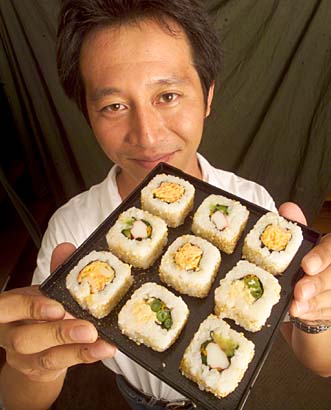

|
TheBuzz Erika Engle |
This is not your
obaachan’s sushiIf nobody told you, you would not know it had been previously frozen.
"Excellent!" and "Mmm," and "What kind of rice is this?" are among the responses Norimune Hasunuma hears when people try thawed samples of the flash-frozen product he imports from California.
Sushi is so closely associated with made-in-front-of-your-face freshness that anything else would seem a stretch. If they hear first that it was frozen, they may not try it, he said.
The product was developed by FIFO Food Systems and is sold by Gardena-based California Gourmet Sushi Inc. Its Web site is at cgsushi.com, which shows the different varieties available, from traditional to inari, or cone sushi, as well as nigiri style with the fish or shrimp draped across the top.
The sushi, made of fresh ingredients and a blend of California and Japanese rice for better moisture retention, is flash frozen at 50 degrees below zero. It can be kept in a regular freezer for up to six months and depending on the variety, will stay fresh if kept refrigerated for 24 to 36 hours after being thawed.
The rolled-type sushi comes pre-cut and packed in thick plastic bags. There are 12 pieces per bag, 20 bags per case, 240 pieces per case. The cases are mix-and-matchable, Hasunuma said.
KEN IGE / KIGE@STARBULLETIN.COM
Norimune Hasunuma holds his frozen sushi, including his California roll, salmon roll and spicy crab roll.
There's also less waste with this sushi, he said.
Sushi at chain-type restaurants that sits for a couple hours gets dried out and must be thrown out, he said.
Grocery and convenience stores, snack shops and other sellers of packaged sushi have to throw away product that doesn't sell, which cuts into profit. "This product, you can sell the next day," Hasunuma said.
Use of the product can also save employment costs, Hasunuma said. "No need hire chef."
He doesn't want to compete against the Kozo Sushis or Genki Sushis of the world. Hasunuma sees opportunities in wholesaling to golf course snack shops, bars, for certain applications at hotels, for cruise ships, or catering operations. When he says "in-flight food service," he gets a gleam in his eyes.
That, he said, would be the key to building a factory in Hawaii. Delivery costs would be reduced significantly, but that may be a year or two away, he said.
Hasunuma became the Hawaii distributor through a calabash uncle in San Jose. Ken Iwamoto was good friends with, but unrelated to, FIFO founder Tad Iwamoto; both were once engineers for Honda.
Hasunuma had been looking for an additional venture because the downturn in Japanese travel to Hawaii had put a dent in his event coordination business, N International Services.
He established California Sushi Inc. for distribution of the sushi.
Several deals and possible deals are in the works, but at the moment the previously frozen sushi is being served only at the Waikiki Yacht Club.
One of the company's big selling points is food safety, which a Host Marriott Services executive cited in a 1998 CNN story on the product.
The flash freezing kills bacteria and is safer than traditional sushi, Hasunuma said.
So, do you have fugu sushi?
"No," he said laughing. But, of the daring and possibly deadly Japanese fish delicacy he said, "But if you order, we can try to make it."
See the Columnists section for some past articles.
Erika Engle is a reporter with the Star-Bulletin.
Call 529-4302, fax 529-4750 or write to Erika Engle,
Honolulu Star-Bulletin, 500 Ala Moana Blvd., No. 7-210,
Honolulu, HI 96813. She can also be reached
at: eengle@starbulletin.com
